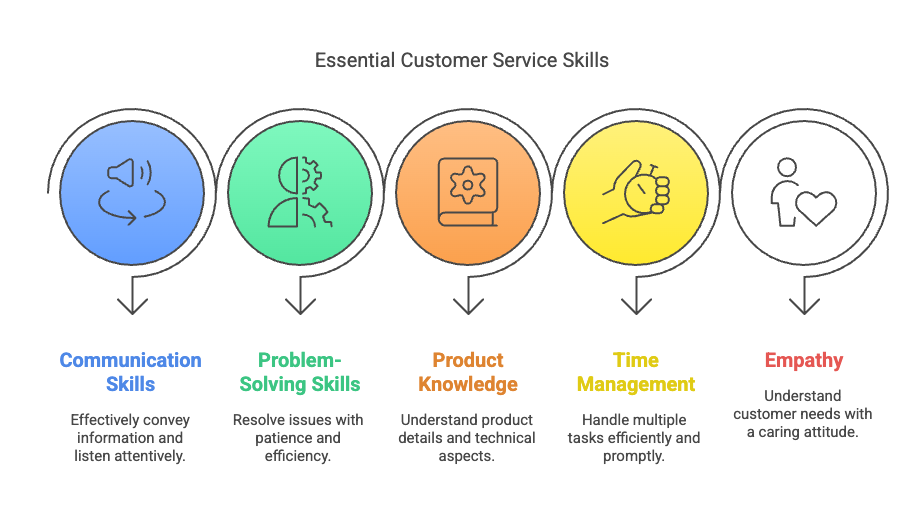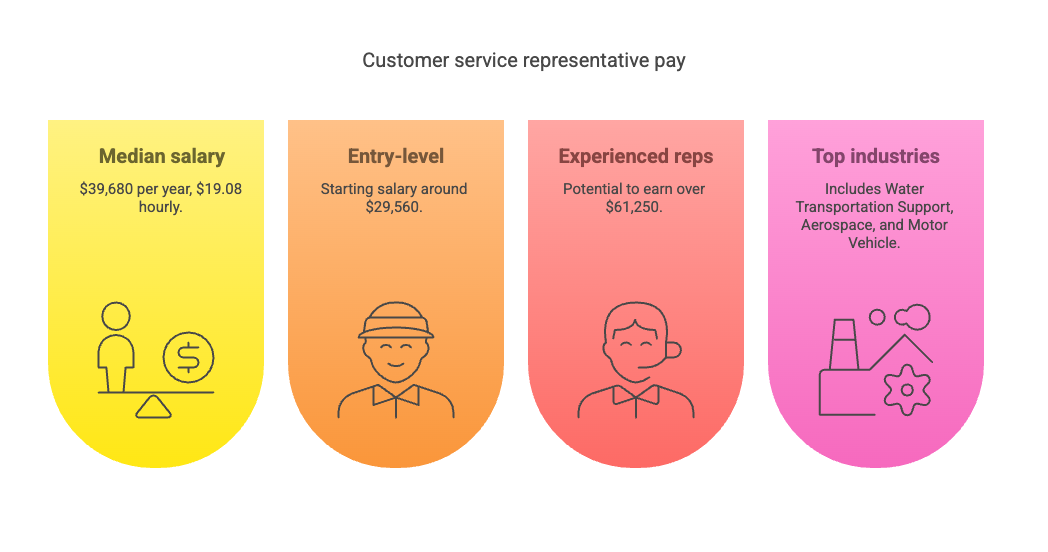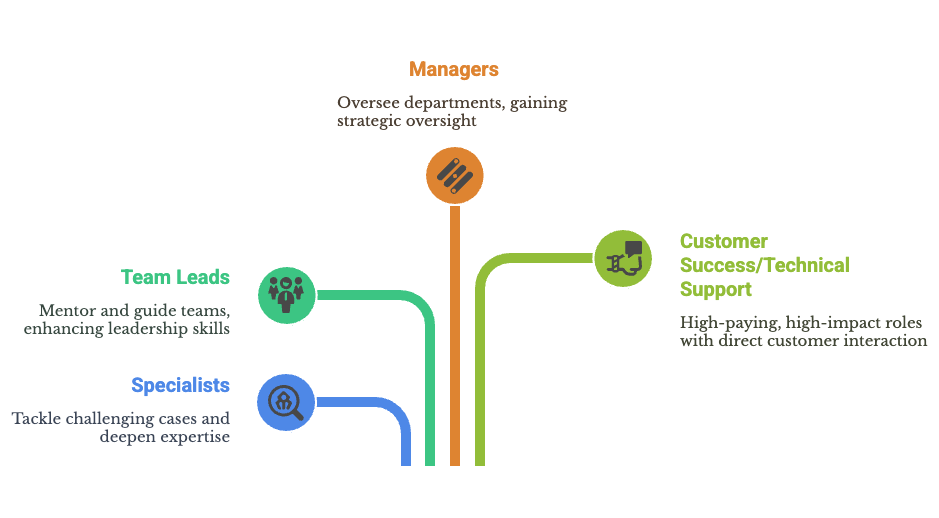Set up AI agents for customer support in less than 10 minutes
Set up AI agents in minutes
How to become a customer service representative (2025): Skills, salary & career path
Sneha Arunachalam .
May 2025 .
-900x600.png&w=3840&q=90)
“Why would anyone choose customer service as a career path?” my colleague asked me over lunch, brow raised in genuine confusion. I smiled — not because it’s a strange question, but because the answer might surprise most people.
It comes down to one thing: human connection.
There are nearly 2.9 million customer service jobs in the U.S. alone. That’s millions of people who wake up each day to help others — answering questions, solving problems, and creating small moments of relief and reassurance. They’re the voice of the company, the first person you talk to when you need help. And it matters — more than most people think.
In fact, 81% of companies with strong customer service outperform their competitors, and a staggering 70% of buying decisions are based on how customers feel they’re being treated.
It’s not just about the product anymore. It’s about how you make people feel.
Yes, the pay is solid — around $39,680 a year or about $19 an hour. But the real reward? The skills you build here stick with you for life. Communication. Patience. Problem-solving. These aren’t just “customer service” skills — they’re life skills.
In this guide, we’ll walk through what it really means to work in customer service, what kind of person thrives in it, how to break into the field, what you can expect to earn — and perhaps most importantly, why this work matters more now than ever.
Let’s start with the basics.
What does a customer service representative actually do?
Watching a good customer service representative in action is kind of like watching a conductor lead an orchestra. It’s smooth. Coordinated. Focused. They're juggling emails, chats, phone calls — and still somehow making every person on the other end feel heard and understood.
A day in their life
There’s a certain rhythm to the work. Most customer service representatives start their day by reviewing their calendar and lining up priorities. Then it’s time to dive into the helpdesk — checking open tickets, following up on unresolved issues, and making sure nothing urgent is about to slip through the cracks.
The core of their day? Real human interactions:
- Answering questions by phone, email, chat, or in person
- Processing orders, returns, or payments
- Digging for answers when someone’s stuck
- Updating customer info
- Passing tricky cases to specialized teams
And it’s not all solo work. Team huddles, trend reviews, training sessions — these moments help keep everyone aligned and growing together. The job is always evolving, and so is the knowledge you need to stay sharp.
Where they work
Customer service representatives are everywhere. You’ll find them in retail stores, insurance companies, call centers, tech startups, and more. Some work in buzzing offices, others from quiet home setups. The flexibility has grown — and so have the options.
And since customers need help around the clock, many customer service representatives work in shifts — mornings, evenings, overnights, weekends. It’s not your typical 9-to-5, but it means help is always just a call or chat away.
What they really do (and why it’s so important)
At the heart of it, customer service representatives are problem-solvers, communicators, and patient listeners. They:
- Explain products or services in plain English
- Help people through issues, big or small
- Keep records tidy and up to date
- Guide customers to the right departments
- Share feedback that helps companies improve
They’re translators, in a way — standing between the company and the customer, helping both sides understand each other. And when they do their job well, everyone wins.
5 Skills that set great customer service representatives apart

I remember a trainee once asking me, “What makes someone great at this job?” I thought about it. Sure, knowing your company’s policies helps. But what really sets someone apart is the human stuff.
Communication + Listening
You’ve got to be able to explain things clearly — no jargon, no fluff. But you also need to really listen. That means:
- Focusing fully on what someone’s saying
- Using those little signals (“I see,” “That makes sense”) to show you’re tuned in
- Paraphrasing concerns back to them
- Asking smart follow-up questions
When you do this right, the customer feels heard. And that changes everything.
Problem-Solving + Patience
Let’s be honest — most customers don’t call in knowing exactly what’s wrong. That’s where your detective skills kick in. You ask the right questions, stay calm, and figure things out piece by piece.
And patience? It’s your superpower. Frustrated people don’t mean to be difficult — they’re just having a tough moment. Staying grounded helps everyone breathe a little easier.
Product + Tech Knowledge
Confidence comes from knowing your stuff. If you understand your company’s products inside and out, you’ll be able to answer questions, make suggestions, and troubleshoot without breaking a sweat.
Staying current matters too. Products change. Tools evolve. The more you stay in the loop, the better you’ll serve your customers.
Time Management + Multitasking
Customer service can move fast. One second you’re wrapping up a call, the next you’re replying to emails while navigating multiple systems. The best reps learn to:
- Prioritize without panicking
- Keep interactions efficient without feeling rushed
- Balance quality with speed
It’s a skill you refine over time — and once you get it, you never lose it.
Empathy + People-First Mindset
Here’s the heart of it. People remember how you made them feel. When a rep is empathetic — genuinely understanding and caring about someone’s experience — that trust builds fast.
And get this: 73% of customers expect companies to understand their needs… but more than half say they don’t feel seen. That’s your chance to change the story — one conversation at a time.
How to get started as a customer service representative (2025 edition)
“Where do I even begin?” someone asked me recently at a job fair. Honestly? You don’t need a fancy degree or ten years of experience. You just need the right mix of basics and heart.
1. Finish high school (or GED)
This is usually the minimum requirement. Some roles may prefer business or communication coursework, but most entry-level jobs are open to anyone with a diploma and a good attitude.
2. Sharpen your skills
Focus on:
- Communication
- Computer literacy (Word, Excel, email tools)
- Problem-solving
- Time management
These are your everyday tools. Community college classes, online platforms like Coursera or YouTube — there are tons of ways to get up to speed.
3. Get experience (even if it’s not in an office)
Worked in retail? Waited tables? Volunteered at an event? That counts. Anything that involved real people, real questions, and real solutions helps. Employers want to see that you can handle interactions gracefully.
4. Consider certifications
Not required, but definitely helpful. Certifications like:
…show employers that you’re serious. Plus, the prep often teaches things you’ll actually use on the job.
5. Learn a second language
If you speak more than one language, you’re instantly more valuable — to both customers and employers. Spanish and Mandarin are especially in demand. And the bonus? Bilingual reps earn, on average, about $10,000 more per year.
What about pay?

Here’s the breakdown:
- Median salary: $39,680/year ($19.08/hour)
- Entry-level: ~$29,560
- Experienced reps: Up to $61,250+
- Top industries:
- Water Transportation Support: $94,790
- Aerospace Manufacturing: $70,620
- Motor Vehicle Manufacturing: $67,320
Pay also depends on location — cities like Chicago and Charlotte tend to offer higher hourly wages than smaller towns.
And even though total job numbers may slightly decline, there's still huge demand due to turnover. In fact, about 365,300 new openings appear every single year. That’s not shrinking opportunity — that’s a revolving door waiting for you to step in.
What’s next? Your career path

Here’s where things get exciting. Customer service isn’t a dead-end job. It’s a launchpad.
Most people start as general reps. But after a year or two, the options start branching out:
- Specialists (tackle the tough cases)
- Team leads (mentor others, lead huddles)
- Managers (oversee entire departments)
- Customer Success / Technical Support (high-paying, high-impact roles)
Some even move into marketing, sales, or product roles — anywhere that benefits from deep customer insight.
And if you love developing people? You might find your place in training, quality assurance, or operations.
The beauty of it? You grow by helping others grow. That’s a win-win.
Final thoughts: Why this work still matters
“Isn’t AI going to replace all of this soon?” a friend asked me not long ago.
Maybe some of it. But not the human part. Not the empathy. Not the feeling of, “Wow, that person really helped me.”
The truth is: customer service roles are still some of the most vital, flexible, and growth-friendly jobs out there. Sure, the average salary starts at around $40K — but with the right skills, certifications, and drive, you can climb far beyond that. And more importantly? You’re building skills that serve you for life.
Because customer service isn’t just about fixing problems. It’s about being a guide, a voice, a calm in someone’s chaos.
And if that sounds like something that speaks to you — then maybe, just maybe, this path is meant for you too.
So go ahead — put on that customer service representative hat, and wear it with confidence. You’ve got this.
Quick summary: How to become a customer service representative
This blog offers a comprehensive look at what it means to be a customer service representative in 2025 — covering the day-to-day responsibilities, essential skills, earning potential, and career growth opportunities. It highlights why this people-focused role remains both relevant and rewarding in an increasingly automated world.
- The role of a customer service representative is centered on solving problems, communicating clearly, and building customer trust.
- Daily tasks include responding to inquiries across phone, email, and chat, managing tickets, processing orders, and escalating issues when needed.
- Work settings range from call centers to remote offices, with flexible shifts to support 24/7 customer needs.
- Success in the role depends on five key skill areas: communication, problem-solving, product/tech knowledge, time management, and empathy.
- Getting started typically requires only a high school diploma or GED, basic computer literacy, and good people skills.
- Experience in retail, hospitality, or volunteering is often sufficient for entry-level roles.
- Optional certifications (e.g., HDI, CCSP) and bilingual skills can enhance employability and boost salary.
- Median salary is around $39,680/year, with higher pay in industries like aerospace and auto manufacturing.
- Career advancement can lead to roles like team lead, support manager, customer success specialist, or transitions into sales and product teams.
- Despite AI’s rise, the emotional intelligence and personal touch of a customer service representative remain essential and irreplaceable.
The blog concludes that being a customer service representative is more than just a job — it’s a foundation for lifelong skills and career mobility. For those who value human connection and problem-solving, it offers a stable, meaningful, and growth-oriented path forward.
Frequently Asked Questions
MORE LIKE THIS
.png&w=3840&q=75)
How to become a customer service representative (2025): Skills, salary & career path

What is customer service? The complete guide with strategies for 2025

Top 20 customer service interview questions: What to expect and how to answer (With examples)
Support made easy. So your team can breathe.



